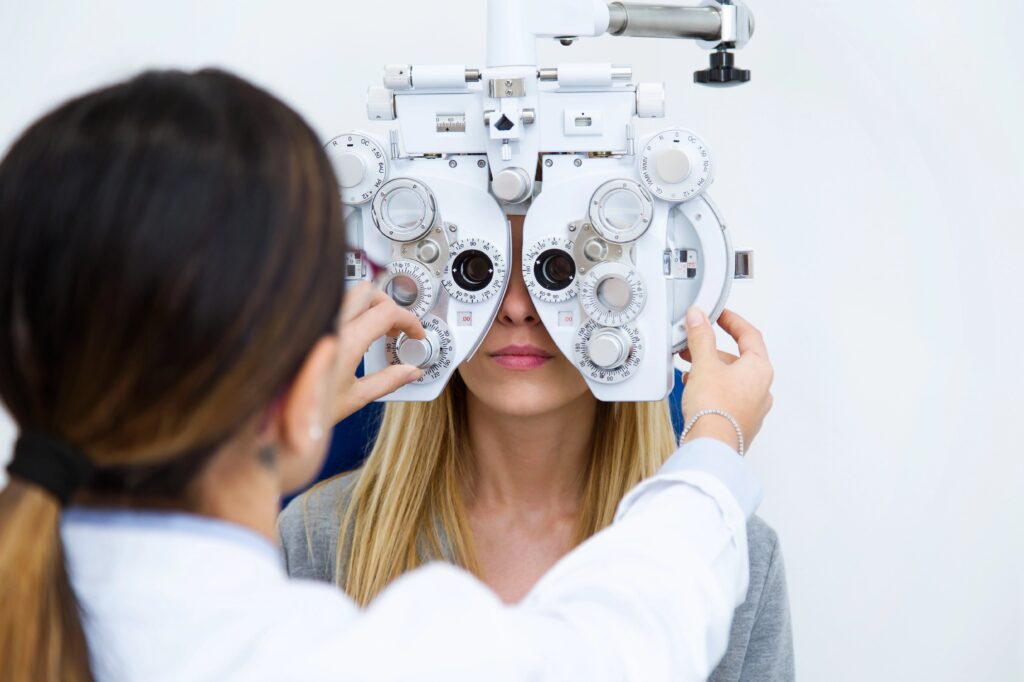When you need help with your teeth, you know to visit the dentist. When it’s time for your yearly physical, you make an appointment with your primary care physician. If your child’s sick, you head to the pediatrician. But what about your eyes? When it comes to caring for your eyesight, it’s easy to get confused by the different types of eye doctors available. After all, both optometrists and ophthalmologists play vital roles in protecting your vision, but they differ in their training, specialties, and services. Whether you’re scheduling a routine eye exam or seeking specialized treatment for an eye condition, understanding the difference between optometrists and ophthalmologists can help you choose the right provider for your needs.

Optometrists vs. Ophthalmologists
To understand the difference between optometrists and ophthalmologists, you’ll need to focus on their training, scope of practice, and the type of care they provide.
- Optometrists hold a Doctor of Optometry degree (OD). They focus on primary vision care, including performing eye exams, prescribing glasses and contact lenses, and detecting common eye problems. In most states, they can also prescribe medications for certain eye conditions. However, they do not perform major eye surgery.
- Ophthalmologists hold either a Doctor of Medicine (MD) or a Doctor of Osteopathic Medicine (DO). They are medical doctors who specialize in eye health and provide comprehensive eye care, including diagnosis, medical treatment, and surgical procedures (such as cataract surgery). While they can also prescribe glasses and contacts, they’re known for their advanced medical and surgical training.
You might also be wondering about opticians, who differ from both optometrists and ophthalmologists. Opticians are trained to fit and dispense corrective lenses based on prescriptions provided by optometrists or ophthalmologists. They don’t perform eye exams, diagnose eye conditions, or prescribe medications. Instead, they focus on lenses and glasses.
Do I Need an Optometrist or an Ophthalmologist?
That depends on what you’re looking for!
For most basic eye care needs, you’ll need to schedule an appointment with an optometrist. Are you due for a routine eye exam to check your vision and overall eye health? Do you need an updated prescription for glasses or contacts? Do you need help with a common eye condition, like dry eye or pink eye? In all of these situations, an optometrist can provide the care you need.
If you need surgery (cataract removal, retinal surgery, etc.) or treatment for a more complex eye disease (advanced glaucoma, diabetic retinopathy, macular degeneration, etc.), you’ll need to see an ophthalmologist. In many cases, this will involve visiting your optometrist for routine vision care and then being referred to an ophthalmologist for surgery or advanced medical treatment. If you experience an eye injury or a sudden change in vision, you will likely also need to contact an ophthalmologist for treatment.
If you aren’t sure whether your concern is more appropriate for an optometrist or an ophthalmologist, don’t hesitate to give your optometrist a call and let them know what’s happening. They can let you know if it’s a problem they’re equipped to handle or refer you to a qualified ophthalmologist.
_____
If you’re looking for an optometrist and you live near southwest Missouri, contact Heffington’s. Since 1975, the Heffington family has been assisting the Springfield community with top-quality eye care and affordable eyeglasses and contacts. One of the unique features of our family-owned business is that we manufacture lenses at our own laboratory, giving us total control over the service and pricing, and we’re happy to pass our savings on to you. To learn more about our products and services, please get in touch with us online, send an email to asktheexperts@heffingtons.com, or give us a call at 417-869-3937 (Optiland location) or 417-882-3937 (House of Vision location). We look forward to hearing from you!
